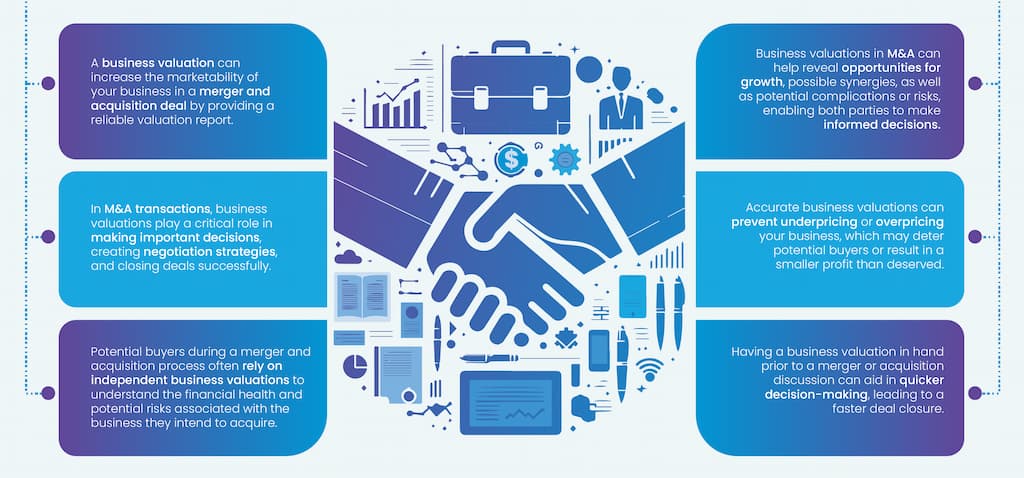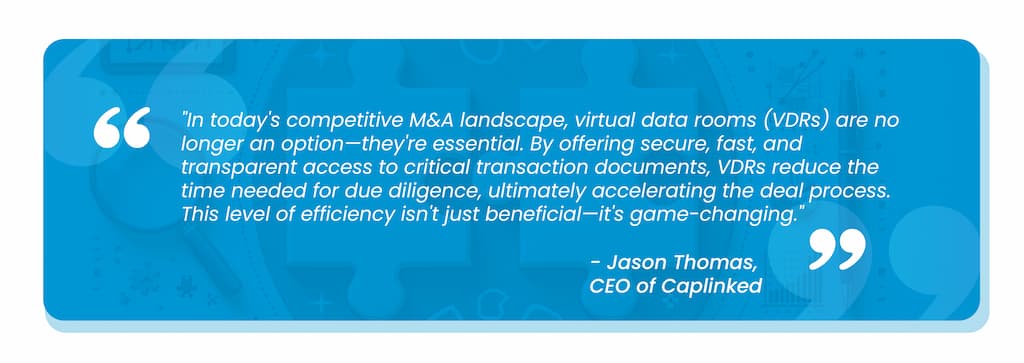Table of Contents
- What is a business valuation?
- What are the benefits of a business valuation?
- Types of business valuations
- Key Concepts & Principles
- Benefits of Business Valuations
- How to Perform a Business Valuation
- M&A Transactions and the Edge of Virtual Data Rooms
Let's dive deeper together. We'll untangle the various types of business valuations, and their differing benefits, and even guide you through a simplified process of how to carry one out. This will be your vital roadmap as you get ready to negotiate for your business during a merger or acquisition.
What is a business valuation?
A business valuation is a systematic process used to establish the economic value of a whole business or a particular unit of a business. The primary goal is to determine the price that potential buyers are willing to pay or sellers are willing to accept in case of a business sale. But beyond that, it provides an in-depth understanding of a company's intrinsic and extrinsic value.
Business valuations incorporate detailed analysis of physical assets, liabilities, brand reputation, and overall market positioning. This process leverages both qualitative and quantitative metrics to ensure a comprehensive and objective analysis of a company's worth.
What are the benefits of a business valuation?
A business valuation provides a clear picture of a company's worth, which is essential for informed decision-making. This understanding can guide strategic planning, helping business owners identify strengths and weaknesses, and pinpoint areas for growth and improvement.
Mergers & Acquisitions
Business valuations are also crucial during negotiations for mergers and acquisitions. They provide an objective basis for determining a fair and equitable price, ensuring that both parties can negotiate from a position of knowledge and confidence.

Investing
Another benefit of a business valuation is that it can help attract potential investors. A comprehensive valuation report can demonstrate the company's growth potential and profitability, making it more attractive to those looking to invest.
Tax Purposes
Business valuations can also be useful for tax purposes. They can help determine the value of a company's assets for tax reporting, potentially leading to more favorable tax treatment.
Legal
Additionally, business valuations can be vital in legal situations. They can provide a solid basis for resolving disputes related to divorce, inheritance, or other legal proceedings that involve the division of assets.

Types of business valuations
Business valuations are a critical part of the merger and acquisition process as they help determine the worth of a company. There are several types of business valuations, each with its unique approach and application.
Asset-Based Approach
Firstly, there's the Asset-based approach which evaluates a business based on the value of its tangible and intangible assets. This approach is often used for businesses that are closing down or are asset-heavy. It can be done on a going concern basis, which assumes the business will continue operating, or a liquidation basis, which assumes the business is ceasing operations.
Income Approach
Secondly, there's the Income approach which values a business based on its ability to generate future income. This approach involves predicting future cash flows and discounting them to their present value. It's often used for businesses with predictable and stable cash flows.
Market Approach
Thirdly, there's the Market approach which values a business based on the selling price of similar businesses in the market. This approach is often used when there are enough comparable businesses to make a reasonable estimate. It's similar to how real estate properties are valued.
Cash Flow Approach
Lastly, there's the Cash Flow approach which values a business based on its ability to generate cash flow. This approach is similar to the income approach but focuses on cash flow rather than profits. It's often used for businesses with significant non-cash expenses.
Each type of business valuation has its strengths and weaknesses, and the choice of which to use depends on the nature of the business and the purpose of the valuation. For instance, the asset-based approach might be more suitable for a manufacturing company with significant tangible assets, while the income approach might be more suitable for a service company with stable and predictable income.
Key Concepts & Principles
Understanding the critical concepts and principles in business valuations is quintessential for an in-depth analysis and to eventually perform a successful Merger & Acquisition. These concepts serve as the backbone of business valuations:
Value in Exchange vs. Value in Use
Value in exchange refers to the amount that can be obtained on a marketplace, while the value in use is the value the business brings to its owner. These are both key factors that can influence the overall valuation of a business. For instance, a lucrative business might have a high value in use because it's profitable for the owner. However, its value in exchange could be lower if there is a small market for the type of business or industry it's involved in.
Benefits of Business Valuations

Performing a business valuation offers numerous benefits. Foremost, understanding the worth of your company is essential during a merger or acquisition, but it's also valuable for strategic planning, tax planning, and fundraising. Let's delve a little deeper into some of these benefits.
Strategic Planning
Understanding your company's value can aid you in making informed decisions about your business's future. You'll be able to identify growth opportunities, as well as areas in need of improvement. A comprehensive business valuation will bring clarity and focus to your strategic planning efforts.
Tax Planning
Valuations help to assess the company's worth, which is crucial when calculating tax liabilities. This can help to avoid any potential disputes with tax authorities and offer reassurance that you're paying the correct amount of tax.
Fundraising
If you're looking to raise funds, having a clear idea of your company's value is paramount. Investors will want to see a business valuation before they decide whether or not to invest. Therefore, a comprehensive valuation can help entice potential investors.
How to Perform a Business Valuation
Performing a business valuation isn't a simple task, but breaking it down into steps can make it more manageable. Here's a step-by-step guide to help you navigate this process:
Gather documents
Firstly, gather all your financial statements and business records. You'll need accurate, up-to-date information about your income, expenses, assets, and liabilities. Looking closely at these can give you a clear understanding of where your business stands financially.
Identifying your Assets and Liabilities
The next step is to identify and list down all your assets, including both tangible and intangible ones, and liabilities. This may include everything from physical property and stock inventory to proprietary software or patents. Similarly, include both short-term and long-term liabilities.
Using the Appropriate Valuation Method
Pick the business valuation method that is most suitable for your situation. This could be one of the four types of valuations - Asset-Based Approach, the Income Approach, Market Approach, or the Cash Flow Approach - whichever best represents your business model and industry.
Analyzing Comparable Businesses
If you're using the Market Approach, you'll need to analyze comparable businesses within your industry. Look at what comparable businesses have recently sold for, to get a general idea of what buyers might be willing to pay for your business.
Seeking Professional Help
Lastly, consider hiring a professional business valuation service. They bring experience and expertise, ensuring an accurate and fair assessment of your business's worth.
M&A Transactions and the Edge of Virtual Data Rooms
In the world of mergers and acquisitions (M&A), the use of virtual data rooms (VDRs) has become increasingly important. VDRs are online repositories used for storing and sharing documents related to a deal.

Elevating Efficiency with VDRs
VDRs can greatly accelerate the M&A process. They provide a secure platform to share sensitive information quickly and conveniently. All parties can access necessary data at any time, from anywhere, eliminating the delays and costs associated with physical data rooms.
Champion Transparency with VDRs
Moreover, VDRs ensure utmost transparency. They allow the managers a clear view of who has accessed what documents and when, thus strengthening the control over the shared data.
Dynamic Collaboration with VDRs
VDRs also support collaboration during M&A due diligence. Various stakeholders can simultaneously review, comment, and update documents, encouraging dynamic and efficient collaboration.
In conclusion, a comprehensive business valuation is crucial in M&A transactions. And, integrating VDRs into these processes not only simplifies them but also enhances their efficacy and trustworthiness.
Want to see what ShareVault can do to help you with your next M&A or business deal?
